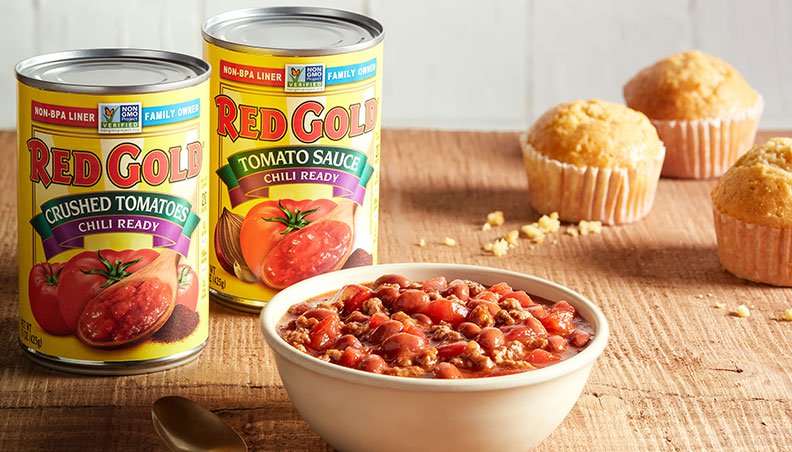
Does Ketchup Need to be Refrigerated?
It’s the age-old question, isn’t it? Ketchup: refrigerated or not refrigerated? Well, it’s time to put away the conspiracy theories and get the real, true answer behind how to properly store ketchup! The experts at Red Gold Tomatoes have put together this comprehensive blog to help answer the question, “does ketchup need to be refrigerated?”
Keep reading to understand the shelf life of ketchup and best practices for storage so you can make an informed decision about your favorite condiment!
Shelf Life of Ketchup: Understanding the Basics
Ketchup: we know it, we love it, we add it to every meal, side dish, and meat product we make! As the key staple in households across the nation, it’s important to understand the best and most efficient ways to store ketchup in order to keep it fresher for longer.
So, whether you’re using ketchup to pair alongside French fries or as a flavor enhancer for your cheeseburger, we’ve got the answers to all of your ketchup shelving questions.
Factors That Affect Ketchup’s Shelf Life
Fortunately for ketchup enthusiasts everywhere, ketchup comes with an extended shelf life, meaning that you can keep it for longer without worrying that it will go bad. Why does it have an extended shelf life? Well, this is because of the ingredients and processing methods used during its production.
While ketchup does have a longer shelf life than most products, it doesn’t mean that it will last forever. In fact, there are a few different ingredients in ketchup that will factor into how long ketchup will last on your shelf.
Acidity
Because ketchup has vinegar in it, it does have a higher acid content. Fortunately, high acidity helps to preserve the product by preventing the growth of spoilage-causing microorganisms and bacteria, ensuring your bottle stays fresher, longer.
Sugar & Salt Content
Ketchup has sugar and salt, which also helps with product preservation. Sugar and salt help to control the water activity in ketchup, so mold and bacteria are less likely to grow within the product.
Packaging
Packaging plays a huge role in preservation. Most brands will use plastic or glass bottles (non-see through ones) that help to keep ketchup fresh and reduce contamination or sunlight exposure.
The Role of Ingredients in Ketchup Preservation
Ketchup undergoes a careful selection of vinegar, sugar, salt, and spices aimed at safeguarding its shelf life. Its elevated acidity and sugar levels serve as innate preservatives.
When the ketchup bottle is unopened, refrigeration has a negligible impact on its longevity. However, once the bottle is opened, the introduction of air can expedite its deterioration. Hence, refrigeration may help maintain the quality and flavor of the product following the initial opening.
Proper Storage Guidelines for Ketchup
Now that you have a better understanding of ingredients and how they play a role in preservation, let’s take a look at storage and how that can help maximize the shelf life of ketchup.
In order to give your ketchup a better chance at staying fresher for longer, you should always store it in a cool, dark place, away from direct sunlight and heat. We recommend opting for a pantry or a kitchen cupboard, as this is typically a perfect location. Make sure to always keep the bottle tightly sealed when you’re not using it as it helps prevent air and other external contaminants from entering the container.
Debunking the Refrigeration Myth: Room Temperature vs. Refrigeration
Now to the age-old question: refrigerator or room temperature? Well, there are actually a few different options for ketchup storage, which may alter or change your decision on how you currently store your ketchup.
The Science Behind Ketchup Preservation
In short, you can store your ketchup in room temperature if that’s how you prefer it. It’s a perfectly safe option as ketchup bottle packages are uniquely designed with airtight seals, greatly reducing the risk of external contaminants in the air from getting inside and spoiling the product.
Combined with the acid from the vinegar and sugar composition, ketchup can remain fresh even outside of the refrigerator. People may simply just prefer their ketchup cold in which case, keep storing your ketchup in the fridge! Either way is fine and is simply down to preference.
Red Gold Tomatoes’ Best Practices for Storing Ketchup
Keeping ketchup in top-notch condition may appear simple, but there are essential guidelines that can safeguard the taste and quality of this popular condiment.
Effective storage not only extends the ketchup's shelf life but also safeguards its flavor and texture, ensuring a consistently delightful and secure addition to your culinary endeavors.
Expert Tips for Preserving Ketchup Freshness
Here are our top tips for preserving your ketchup’s freshness – both in the fridge and in the pantry.
Unopened Bottles
Make sure to store any unopened ketchup bottles in a cool, dark pantry or cupboard, away from direct sunlight and heat sources. This will eliminate any risk of external contaminants from getting inside the bottle.
Opened Bottles
Once your ketchup bottle has been opened, you can either store it in the refrigerator or out in the open. As we mentioned, the air tight seal will help to ensure the quality, however, the fridge is always the best bet for keeping products fresher for longer.
Shake Well
Finally, before using any refrigerated ketchup, make sure to shake the bottle well to mix any separated ingredients!
Understanding Expiration Dates and Quality Indicators
Ketchup commonly features a label indicating a "best by" or "use by" date. This date functions as a reference point for when the product is anticipated to be at its peak quality but doesn't imply that the ketchup will suddenly go bad once that date passes. Provided that the ketchup has been stored correctly, it should still be safe for consumption beyond the date indicated on the bottle. If you’re still unsure, check the color. The bright, vibrant red will degrade before anything else, so if you notice any dulling of color it might be time to restock!
Red Gold Tomatoes’ Quality Assurance Standards
At Red Gold Tomatoes, we take pride in producing our ketchup products and adhere to rigorous quality assurance standards in both our manufacturing and labeling process. We’re committed to our customers and their safety and guarantee the quality of our products, even after the suggested date.
Making the Right Choice for Ketchup with Red Gold Tomatoes
Whether you choose to keep your ketchup on the pantry shelf or in the fridge, know that with Red Gold Tomatoes’ ketchup products, you’ll always be getting the highest quality ingredients and premium, classic taste you love!
Shop our wide variety of ketchup products today or get in touch with us for more information on how to store ketchup.




